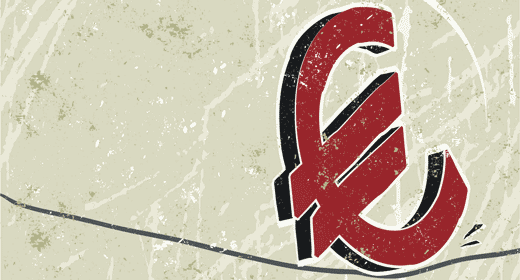
For many of us, the year 2006 was part of a different time. Our retirement accounts were increasing in value. Our house values were going up, up, up. Without much difficulty, we could borrow money to buy houses, make home improvements, or buy cars, boats, and refrigerators. Our spending was keeping the economy humming. For lots of us, the financial future looked bright.
Now, of course, we know that this would all change within just a year. In fact, in 2006 the collapse was already underway, but at the time most of us were optimistic — hoping we were simply going through a rough patch, a slow-down of our ever-strengthening economy.
In this pre-cataclysmic year 2006, Ford School Professor Kathryn M. Dominguez presented a paper at the European Central Bank (ECB) titled "The European Central Bank, the Euro, and Global Financial Markets." In part, the paper compared the formation of the European Economic and Monetary Union to the development of the U.S. financial system.
The word experiment isn't in the paper, but Dominguez used it in her presentation. "I called it an experiment," she says, "because many people wondered if it were actually possible to have a monetary union without a political union. This was an experiment because it had never been done before."
 |
|
Kathryn M. Dominguez |
Our system in the U.S. had also been experimental at one time. In 1775, the original 13 states came together to share a single currency just as in 1999 the European Union (EU) countries came together under the euro.
The newly-formed United States, however, had a shared government to go with that shared currency. The federal government had the power to set fiscal policy and exert some economic control through taxation and government spending. "Europeans took half of what we had done," says Dominguez. "They took the single currency but decided not to create a national government or a national fiscal authority, whereas in the U.S. we have both state and national fiscal authorities."
Prior to the euro's introduction in 1999, most non-EU economists were skeptical about its success. They believed the EU countries were too dissimilar to share a currency and that the lack of central fiscal authority was a fatal flaw.
To the surprise of economists, by the time of Dominguez's 2006 presentation to the ECB, the Eurozone experiment seemed to be working. It had opened borders between the EU countries to allow for the flow of trade, capital, and labor. Interest rates in the EU countries were converging, as would be likely under a national fiscal authority. It seemed that the monetary union had unified the region economically, without the need for an explicit fiscal or political union.
Presciently, Dominguez concluded in her 2006 paper that "the true test of the influence of the European Central Bank and the longevity of the euro has yet to come. The U.S. Federal Reserve has proved itself able to calm financial markets and keep the U.S. economy on track even in the face of dramatic financial turbulence. It is less clear what role the European Central Bank would play if...one country or region within Europe were to go into financial crisis."
The world was about to find out.
While Dominguez was addressing the ECB audience, what we now know is that a bubble in the U.S. housing market was bursting. The seemingly nonstop rise in the values of U.S. homes had ceased and prices had begun to slide. New construction was dropping and foreclosures increasing. By the end of August 2006, President Bush announced measures to help mortgage-holders avoid default and stem the burgeoning sub-prime mortgage crisis.
Most Americans were understandably focused on the domestic implications of the unfolding crisis, but international economists like Dominguez understood that shocks to international finance reverberate across borders.
The failing sub-prime mortgage market hit international as well as domestic banks and institutions.
The U.S. financial crisis sent waves across the world, leading to a global recession. As for Europe's troubles, Dominguez says, "The beginnings are rightly put at the doorstep of the United States. Some European banks had bought the subprime mortgage assets and some held a lot of them."
"It wasn't the cause of the European crisis, but it was one of the precipitating events."
It was the international banks' decisions to purchase what turned out to be bad investments; no one forced them to buy what became known as "toxic assets." Part of the blame lay with the credit-rating agencies that, in hindsight, offered too-generous ratings for these assets. But Dominguez doesn't go in much for finger pointing: "There's lots of blame to go around," she says. There were many questionable or downright bad decisions that interacted with one another to pull down economies around the globe.
The EU countries that have fallen furthest during the global recession are some of the poorest: Greece, Portugal, Ireland, and Spain. The first three have needed and received bailouts from the International Monetary Fund and the EU; Spain looks to be next in line. The reasons the countries required help vary; in Greece and Portugal it was government over-spending, while in Ireland and Spain private debts arising from property bubbles led to the need for banking system bailouts. Poor countries like Greece were expected to benefit most from the Eurozone. Ironically, low interest rates and the euro's relative strength are what allowed these countries to finance deficit spending and property booms.
The crisis is ongoing, with new developments reported almost daily. Germany, with the most powerful economy in the EU, holds tremendous decision-making power over how Eurozone institutions respond to the troubled countries' need for assistance. Greece, with 25 percent unemployment, has enacted four austerity packages in attempts to reduce its budget deficit and secure bailout funds from the Eurozone. Within the EU, Britain publicly debates withdrawal, and people talk about the benefits of desperate countries like Greece withdrawing from the Eurozone.
Will the euro survive? Does the significant difference between the Eurozone experiment and the United States 18th century experiment — namely the lack of a central fiscal authority — leave too little to bond the EU countries together in the face of persistent economic difficulties? The outcome of the Eurozone experiment is uncertain. For now, the players are working to prove that where there's a will, there's a way.
Dominguez, along with the rest of us, wait to see if they can find the way.
--Story by Bob Brustman
Below is a formatted version of this article from State & Hill, the magazine of the Ford School. View the entire Fall 2012 State & Hill here.